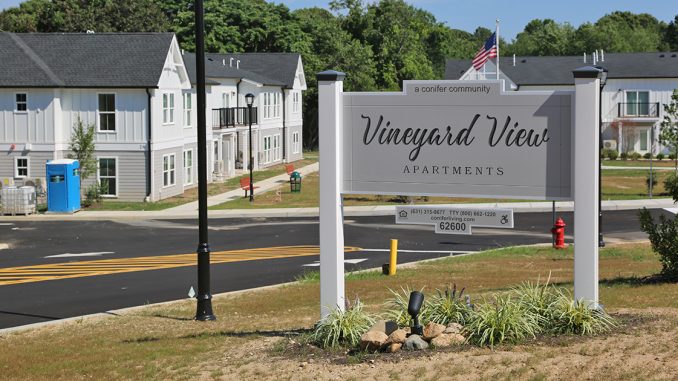
Southold voters have approved a proposition to allow a 0.5% real estate tax to fund solutions for a housing crisis on the East End that has only grown more extreme in recent years.
East Hampton and Southampton will also adopt the transfer fee, while an ongoing count of votes on Shelter Island has shown a narrow disapproval. Riverhead Town opted out of the referendum. The transfer tax could bring in between $1 million and $2 million per year for community housing in Southold, which has seen its median home price increase at a rate that far outpaces the increase in median household income in the town.
The fee is part of the Peconic Bay Region Community Housing Act, which was signed into law by Gov. Kathy Hochul last fall. Now that the tax has passed, the Southold Town Board must approve a plan to implement the funds after a public hearing. The town will start collecting funds in 2023, but may not spend them until a plan is in place, which town officials have said may take months to finalize.
There would be a $200,000 exemption for sales, an increase from the current exemption on the Community Preservation Fund transfer tax. The exemption would not apply to properties selling for over $2 million. There would also be a $75,000 exemption for vacant land.
“The legislation as drafted was very broad and the intent there by Assemblyman Fred Thiele [D-Sag Harbor] was to give towns as much opportunity as possible to craft it around their specific needs,” said Southold Town Supervisor Scott Russell. “There is nothing in that law that requires we implement any aspect of it.
“It’s important to stress that because there has been information going out there that this law would allow people to get grants to buy houses at as much as $1.2 million and that’s misleading and factually incorrect, because the limit does not go that high for the North Fork, but it’s also misleading because the mere adoption of this law does not require a town to provide funds for any such thing,” he added.
The fund can be used to create apartments, new houses for ownerships, grants and other things, according to Mr. Russell. The town’s consultant will work with the community on a formal plan and the funds collected will remain in a dedicated account that can’t be accessed until the plan is adopted, he emphasized.
As the town works on a “thorough” and “well thought out” plan, the CHF board plans to organize community workshops for public input, Mr. Russell said. He added that the town already has a separate housing fund with money from developers who have bought out of inclusionary zoning requirements and any policy created by the new CHF program might be applied to that fund as well.
“We have no obligation to mingle the two but currently we do not have a plan for utilization of those funds and we should use whatever model we come up with as a basis for allocating those funds,” Mr. Russell said.
The Southold approval has been celebrated by housing advocates and welcomed by the CHF board. Town councilwoman Jill Doherty, who is a member of the town Housing Advisory Commission, emphasized via email that “these funds will help all age groups that are working hard but can’t quite make it on their own.”
“I believe the community has shown that they see a need for housing that is obtained at a reasonable cost, especially with the economy of today,” she said. “Now we get to work on how the community wants to see the housing plan roll out while we can start collecting funds.”
Patricia Luzky, co-chair of HAC, highlighted the flow of funding the fee will bring to the town’s effort to create more affordable housing and said the committee “thanks the voters for taking the long view on this issue and allowing the flow of funding to begin.”
“The need for housing is clear. The sustainability of our infrastructure — teachers, firefighters, healthcare workers and young people who live and work in our towns — depends on it,” said Michael Daly, founder of East End YIMBYs. YIMBY stands for YES! In My Backyard and is a play on the term NIMBY, which stands for Not In My Backyard, referring to people who generally oppose affordable housing.
“The Community Housing Fund provides a new and important tool to provide new housing opportunities. We look forward to working with the towns to implement this through their housing plans,” Mr. Daly added.
The CHF advisory board presented a draft outline of a plan at a Southold work session ahead of the vote last week. More information about the legislation is available on the town website.

